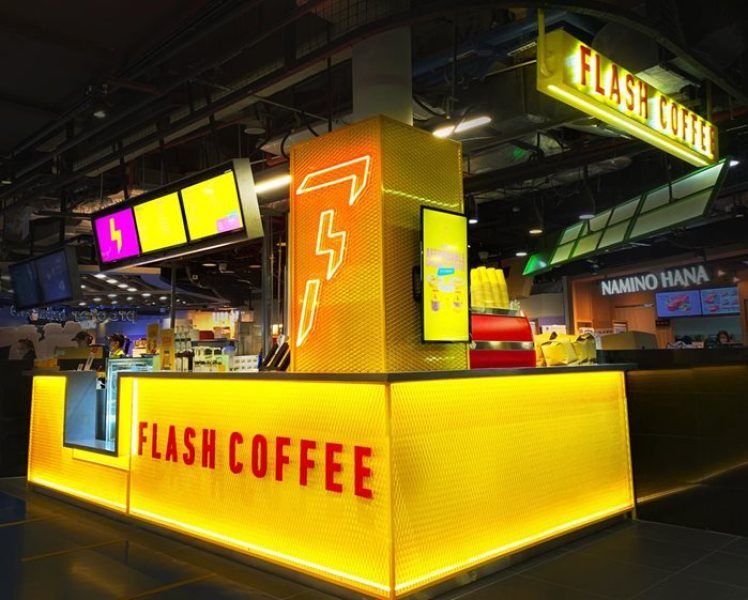Flash Coffee, a rising star in the coffee industry, has been making waves with its innovative approach to coffee consumption. As the name suggests, Flash Coffee is not just about the speed of service; it represents a revolution in the traditional coffee shop model. This article delves into the Flash Coffee Wiki, exploring the company’s history, its unique business model, the technology behind its success, and the impact it’s having on the coffee culture.
History of Flash Coffee
From Humble Beginnings to International Stature
The inception of Flash Coffee in 2020 marked the beginning of a remarkable journey that saw the transformation of a local startup into a global player in the coffee industry. Founded by David Jonathan Brunier in Indonesia, the story of Flash Coffee is one of innovation, resilience, and an unwavering commitment to redefining the traditional coffee experience.
Founding Vision
David Brunier, a visionary entrepreneur with a passion for both technology and coffee, set out to challenge the status quo in the coffee industry. His vision was to create a coffee brand that not only delivered exceptional quality but also revolutionized the way people consume coffee in their fast-paced lives.
Early Challenges and Growth
In its early days, Flash Coffee faced the challenges typical of any startup — from securing funding to establishing a customer base. However, the company’s unique proposition, centered around speed, technology, and quality, quickly gained traction. The initial success was a testament to the demand for a coffee experience that aligned with the contemporary lifestyle.
Expansion Across Southeast Asia
With the initial success in Indonesia, Flash Coffee wasted no time in expanding its operations across Southeast Asia. The company strategically targeted key metropolitan areas, where the bustling urban lifestyle created a natural demand for a coffee brand that could cater to the on-the-go consumer.
Navigating the Challenges of a Global Pandemic
The year 2020 brought unprecedented challenges to businesses worldwide with the onset of the COVID-19 pandemic. However, Flash Coffee exhibited resilience and adaptability. Leveraging its technology-driven approach, the company swiftly adapted its operations to comply with safety measures while maintaining its commitment to speed and efficiency.
Technology at the Core
One of the defining features of Flash Coffee’s history is its relentless integration of technology into every aspect of its operations. From the moment a customer places an order through the mobile app to the automated brewing processes within the stores, technology is not merely a tool but a fundamental driver of the company’s success.
Mobile App Innovation
The Flash Coffee mobile app, a cornerstone of its success, goes beyond the conventional role of order placement. It serves as a portal for customer engagement, loyalty programs, and real-time feedback. The intuitive interface not only simplifies the ordering process but also enhances the overall customer experience.
Automated Brewing and Quality Assurance
Flash Coffee’s commitment to delivering a consistent product is realized through state-of-the-art automated brewing systems. These systems not only ensure speed but also maintain the high quality that the brand promises. Temperature control, precise measurements, and calibrated processes contribute to the uniformity of each cup, setting a new standard for coffee chains.
Navigating Challenges and Criticisms
While Flash Coffee has earned widespread acclaim, it has not been immune to criticisms and challenges. The rapid-paced model has faced pushback from traditionalists who argue that it sacrifices the artisanal aspects of coffee preparation. Additionally, concerns about environmental sustainability have been raised, prompting the company to implement initiatives aimed at reducing its ecological footprint.
Balancing Tradition and Innovation
The balance between tradition and innovation is a delicate one, and Flash Coffee recognizes the importance of preserving the cultural and artisanal aspects of coffee culture. Efforts to strike this balance involve periodic updates to the menu, introducing both classic favorites and innovative creations, ensuring that the coffee experience remains dynamic and engaging.
Environmental Responsibility
Acknowledging the environmental concerns associated with single-use packaging, Flash Coffee has taken proactive steps to address this issue. Initiatives promoting the use of reusable cups, implementing eco-friendly packaging, and exploring sustainable sourcing practices demonstrate the company’s commitment to minimizing its environmental impact.
Future Trajectory
As Flash Coffee continues to expand its reach across Asia and beyond, its history serves as a roadmap for the future. The company’s adaptability, agility, and commitment to leveraging technology suggest a trajectory marked by sustained growth and influence.
Global Expansion and Market Dynamics
Flash Coffee’s successful foray into international markets positions it as a key player in the global coffee industry. The company’s ability to navigate diverse market dynamics and adapt its model to different cultural contexts is indicative of its potential to become a defining force in the global coffee landscape.
Innovation Beyond Coffee
The innovative spirit that defines Flash Coffee’s history is likely to extend beyond the realm of coffee. With technology as a driving force, the company might explore new avenues within the food and beverage sector, setting the stage for a broader impact on how consumers engage with culinary experiences.
The history of Flash Coffee is a testament to the transformative power of innovation and technology in an industry deeply rooted in tradition. From its humble beginnings to its current status as an international coffee giant, Flash Coffee’s journey reflects not just a business success story but a cultural shift in how we perceive and consume one of the world’s most beloved beverages. As the company continues to brew up innovation, its history becomes not just a narrative of the past but a compelling preview of what the future holds for the coffee industry and beyond.
The Flash Coffee Experience
1. Speed and Efficiency
One of Flash Coffee’s defining features is its commitment to speed. Leveraging technology to streamline operations, customers can order and receive their coffee swiftly, making it an ideal choice for those on the go. The company has strategically positioned its stores in high-traffic areas, ensuring accessibility and convenience for its customers.
2. Mobile App Integration
Flash Coffee’s mobile app is at the heart of its efficiency. Customers can browse the menu, customize their orders, and pay seamlessly through the app. The app also offers loyalty programs and discounts, incentivizing repeat business. This digital integration not only enhances customer experience but also provides valuable data for the company to understand consumer preferences.
Flash Coffee Wiki: Behind the Scenes
1. Tech-driven Operations
Flash Coffee relies on cutting-edge technology to optimize its operations. From automated coffee machines that ensure consistency in every cup to advanced inventory management systems, technology is embedded at every stage of the process. This tech-forward approach not only ensures efficiency but also contributes to a more sustainable business model.
2. Data Analytics
The company’s use of data analytics is a game-changer. By analyzing customer preferences, popular trends, and peak hours, Flash Coffee can make informed decisions about its menu, pricing, and store locations. This data-driven strategy allows the company to stay ahead of market demands and adapt quickly to changing consumer behaviors.
The Impact on Coffee Culture
1. Accessibility and Inclusivity
Flash Coffee’s model promotes accessibility. With its presence in busy urban centers, it caters to a diverse demographic. The speed and affordability of its offerings make quality coffee accessible to a broader audience, challenging the perception that specialty coffee is exclusive.
2. Innovation in Menu
Flash Coffee’s menu is not just about the classics; it’s a blend of tradition and innovation. The company introduces unique and seasonal items, keeping the menu dynamic and exciting. This approach encourages customers to explore different flavors, fostering a culture of experimentation and discovery.
Challenges and Criticisms
While Flash Coffee has been widely successful, it is not without its share of challenges and criticisms. Some traditionalists argue that the rapid-paced model compromises the art and ritual of coffee preparation. Additionally, concerns about the environmental impact of single-use cups and packaging have been raised. However, it’s worth noting that Flash Coffee has initiatives in place to address these concerns, such as promoting reusable cups and implementing eco-friendly packaging.
Navigating Challenges and Addressing Criticisms: The Flash Coffee Saga
The success of Flash Coffee is undoubtedly impressive, but like any innovative venture, it hasn’t been without its fair share of challenges and criticisms. In this section, we delve deeper into the hurdles faced by Flash Coffee and how the company has responded to constructive criticisms.
1. Artisanal Integrity vs. Speed: Striking the Right Balance
Challenge:
Traditionalists within the coffee community argue that the rapid, technology-driven approach of Flash Coffee compromises the art and ritual of coffee preparation. The intricate dance of manually brewing coffee, often seen as an artisanal craft, can be overshadowed by the efficiency-focused model of Flash Coffee.
Response:
Flash Coffee acknowledges the importance of preserving the artisanal aspects of coffee culture. To address this concern, the company actively engages with coffee communities, hosts workshops, and ensures that the human touch in coffee preparation is not entirely lost. Special attention is given to training baristas in the nuances of brewing, ensuring a blend of technology and craftsmanship.
2. Environmental Sustainability: Tackling Single-Use Packaging Concerns
Challenge:
As with many fast-service models, Flash Coffee faced criticism regarding the environmental impact of single-use cups and packaging. The convenience offered by disposable containers clashes with the growing global awareness of the ecological consequences of such practices.
Response:
Flash Coffee has responded proactively to these concerns by implementing environmentally conscious initiatives. The company actively promotes the use of reusable cups by offering discounts to customers who bring their own. Furthermore, Flash Coffee is investing in research and development to explore sustainable packaging alternatives, aligning its business practices with the growing global emphasis on environmental responsibility.
3. Market Saturation and Competition: Staying Ahead in a Crowded Market
Challenge:
As Flash Coffee expands globally, it encounters the challenge of market saturation and heightened competition. In densely populated urban areas, the market is already flooded with various coffee options, making it crucial for Flash Coffee to distinguish itself and maintain its unique value proposition.
Response:
Flash Coffee addresses this challenge through a combination of strategic market analysis and continual innovation. By leveraging data analytics, the company identifies gaps in the market and tailors its offerings to meet specific consumer demands. Constant updates to the menu, introduction of limited-time offerings, and collaborations with local influencers and brands keep the brand fresh and relevant, ensuring it stands out in a crowded market.
4. Balancing Innovation with Tradition: Meeting Diverse Consumer Tastes
Challenge:
Introducing innovative and trendy items on the menu might appeal to some segments of the market, but it can alienate those who prefer the familiarity of classic options. Striking the right balance between innovation and tradition becomes a delicate dance for Flash Coffee.
Response:
Flash Coffee maintains a dynamic menu that combines both classic and innovative offerings. While new, seasonal creations add an element of excitement, staple items ensure that customers seeking a more traditional coffee experience are not left out. The company actively seeks customer feedback and adapts its menu based on evolving tastes and preferences.
5. Technological Dependency: Mitigating Risks of Overreliance
Challenge:
Flash Coffee’s success hinges significantly on technology, from mobile app integration to automated brewing systems. However, overreliance on technology poses risks, including potential system failures, security concerns, or disruptions in the supply chain.
Response:
Flash Coffee recognizes the potential risks associated with technological dependency. The company invests in robust cybersecurity measures to protect customer data and ensure the smooth functioning of its digital platforms. Additionally, there are contingency plans in place to handle any technological disruptions, ensuring that the customer experience is minimally affected in the event of unforeseen challenges.
Conclusion: A Resilient Brew of Innovation and Adaptability
As Flash Coffee continues to navigate through the challenges and respond to criticisms, its journey exemplifies a commitment to not only revolutionize the coffee industry but to do so with a keen awareness of the evolving needs and concerns of its customers and the broader community. The challenges encountered are not roadblocks but stepping stones, pushing Flash Coffee to innovate and adapt, ensuring that its impact on the coffee culture remains positive and sustainable. In a world where consumer expectations and environmental consciousness are continually evolving, Flash Coffee stands as a testament to the fact that true success lies not just in overcoming challenges but in turning them into opportunities for growth and improvement.
Future Prospects
As Flash Coffee continues to expand its footprint across Asia and beyond, its future prospects seem promising. The company’s agility, driven by data-driven decisions and technological integration, positions it well to adapt to evolving consumer preferences. Flash Coffee has the potential not only to reshape the coffee industry but also to set new standards for efficiency and innovation in the broader food and beverage sector.
Conclusion
Flash Coffee’s journey from a local startup to an international coffee powerhouse is a testament to the potential of merging technology with traditional industries. The Flash Coffee Wiki serves as a guide to understanding the brand’s history, its impact on the coffee culture, and the technological innovations that power its success. Whether you’re a coffee enthusiast, a business strategist, or someone intrigued by the intersection of technology and culinary arts, Flash Coffee stands as a fascinating case study in modern entrepreneurship and innovation.






